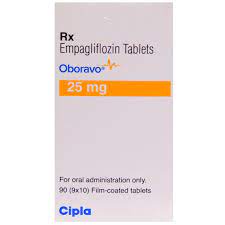vicra EMPAGLIFLOZIN
Introduction to vicra
Vicra is a medication primarily used to manage and treat certain medical conditions. It is known for its effectiveness in addressing specific health issues, making it a valuable o... See More
Is Vicra safe for the elderly?
Elderly patients using Vicra may have an increased risk of dehydration and urinary tract infections. It's important for them to stay hydrated and monitor for signs of infection. Regular check-ups with a doctor are recommended to ensure safe use.

Does Vicra make it hard to think or concentrate?
Vicra doesn't typically cause thinking problems or concentration difficulties. Most people take this medication without experiencing any changes in their mental focus or memory. Cognitive issues like confusion or trouble concentrating aren't listed as known side effects of Vicra. If you notice problems with your thinking after starting this medication, talk with your doctor. These symptoms might be related to something else, such as low blood sugar, which is when your blood glucose drops too low, or another health condition. Your doctor can help determine what's causing these issues and suggest solutions while keeping your treatment plan on track. Don't stop taking Vicra without talking to your doctor first.

Does Vicra interfere with sexual function?
Vicra doesn't typically cause sexual side effects like erectile problems or reduced sexual desire. Most people take this medication without noticing changes in their sexual function. However, Vicra can sometimes cause genital yeast infections, which might make sexual activity uncomfortable. These infections, which cause itching and irritation in the genital area, are usually mild and can be treated with antifungal medications. If you experience any persistent discomfort in your genital area or notice changes in your sexual function while taking Vicra, talk with your doctor. Your doctor can help determine if your symptoms are related to the medication and recommend appropriate treatment to address any issues while continuing your diabetes care.

How do I take Vicra?
Vicra is a once-daily pill you should take each morning, with or without food. Vicra can be crushed or mixed with water or food. If you miss a dose, take it when you remember unless it's almost time for your next dose. Then just skip the missed dose and continue your normal schedule. Never take two doses at once. While taking Vicra, you don't need to avoid specific foods, but drinking enough water is important to prevent dehydration, which means your body doesn't have enough fluids. Try to avoid alcohol while on this medication. Alcohol can increase your risk of ketoacidosis, which is a serious condition where harmful acid levels build up in your blood, and can worsen dehydration. Always follow your doctor's specific advice about diet and fluid intake while taking this medication.

Does Vicra cause headaches?
Headaches are not a common side effect of Vicra. Most people take this medication without experiencing any head pain. While Vicra can cause other side effects like urinary tract infections, which are infections in the system that removes urine from your body, headaches aren't typically linked to this medication. If you do get mild headaches while taking Vicra, staying well-hydrated and resting may help. You can also take over-the-counter pain relievers after checking with your doctor. For severe or persistent headaches that develop after starting this medication, talk with your healthcare provider. Your doctor can help determine if your headaches might be related to Vicra or if they have another cause that needs attention.

What is the usual dose of Vicra?
Adults typically start Vicra with a 10 mg pill once each morning, which you can take with or without food. Your doctor may increase your dose to 25 mg daily if you need better blood sugar control and handle the starting dose well. Children 10 years and older with type 2 diabetes also begin with 10 mg daily, which can be increased to 25 mg if needed. Elderly patients and those with kidney problems, which affect organs that filter waste from your blood, need careful monitoring when taking this medication. Always follow your doctor's specific dosing instructions for your personal health needs.

Does Vicra have any safety warnings?
Vicra has important safety warnings you should know about. This medication can increase your risk of diabetic ketoacidosis, which is a dangerous buildup of acids in your blood. This can happen even when your blood sugar is normal, especially if you miss insulin doses or get sick. If you experience nausea, vomiting, stomach pain, or breathing problems, get emergency help. Vicra can cause dehydration, which means your body doesn't have enough fluids. This may lead to low blood pressure or kidney problems. Drink plenty of water while taking this medicine. Serious urinary tract infections, which are infections in the system that removes urine from your body, can occur. Watch for painful urination, fever, or back pain. Although rare, this medication can cause necrotizing fasciitis, which is a serious bacterial infection in the genital area requiring immediate medical attention. Genital yeast infections are common with Vicra. Regular foot care is important as this medicine may increase amputation risk in some patients. Stop taking the medicine and seek help if you develop signs of an allergic reaction.

Is Vicra addictive?
Vicra is not addictive or habit-forming. This medication doesn't cause dependency or withdrawal symptoms when you stop taking it. Vicra works by affecting your kidneys to help remove sugar through urine. This mechanism doesn't affect brain chemistry in ways that could lead to addiction. You won't experience cravings for this medication or feel compelled to take more than prescribed. Unlike some medications that can cause psychological or physical dependence, Vicra doesn't create these effects. If you have concerns about medication dependence, you can feel confident that Vicra doesn't carry this risk while managing your health condition.

Does Vicra have adverse effects?
Vicra can cause unwanted reactions, though most people tolerate it well. Urinary tract infections, which are infections in the system that removes urine from your body, affect up to 9% of people taking this medication. Genital yeast infections are common, especially in women. These infections cause itching and unusual discharge. The medication increases urination and can lead to dehydration, which means your body doesn't have enough fluids. This might make you feel dizzy. A rare but serious effect is ketoacidosis, which is a dangerous buildup of acid in your blood. This requires immediate medical attention. Very rarely, people develop severe allergic reactions, kidney problems, or Fournier's gangrene, which is a serious infection of the genital area. Always tell your doctor about any new or worsening symptoms while taking Vicra.

What are the most common side effects of Vicra?
Side effects are unwanted reactions that can happen when taking a medication. With Vicra, these effects vary from person to person. The most common side effect is urinary tract infections, which affect about 8-9% of people taking this medication. Women may experience genital yeast infections, which occur in about 2-5% of female patients. Men can also get genital yeast infections, but this happens less frequently. Some people notice they urinate more often when taking Vicra, which happens in about 1-3% of patients. Upper respiratory infections, which affect your nose, throat, and airways, occur in about 4% of people taking this medication. If you notice new symptoms after starting Vicra, they might be temporary or unrelated to the medication. Talk with your doctor before stopping any medication.

Is Vicra effective?
Vicra treats type 2 diabetes, chronic kidney disease, which is damage to organs that filter waste from your blood, and heart failure, which is when your heart can't pump blood effectively. This medication works by blocking a kidney protein called SGLT2. This blocking action causes your body to remove more sugar through urine, which lowers blood sugar levels. Clinical studies show Vicra significantly improves blood sugar control in diabetes patients, lowering HbA1c levels, body weight, and blood pressure. For heart failure patients, the medication reduced the risk of hospitalization and death from heart problems by 25% compared to placebo. In people with chronic kidney disease, Vicra lowered the risk of worsening kidney function or death from heart problems by 28%. These results show Vicra effectively manages blood sugar, improves heart health, and helps preserve kidney function.

Who should avoid taking Vicra?
Don't take Vicra if you're allergic to it or its ingredients. Serious allergic reactions, which cause rash, hives, or swelling that makes breathing difficult, require immediate medical help. This medication isn't for people with type 1 diabetes because it increases the risk of diabetic ketoacidosis, which is a dangerous buildup of acid in your blood. Vicra shouldn't be used by people with severe kidney problems, which affect organs that filter waste from your blood, as it won't work well and might worsen kidney function. Avoid this medication during pregnancy, especially in the later months, as it may harm your baby. Breastfeeding mothers shouldn't take it either, as it may pass into breast milk. Older adults have higher risks of dehydration, which means your body doesn't have enough fluids. Be careful when taking Vicra with water pills, as this combination increases dehydration risk. Always consult your doctor about these concerns.

How do I know if Vicra is working?
Vicra treats type 2 diabetes, chronic kidney disease, which is damage to organs that filter waste from your blood, and heart failure, which is when your heart can't pump blood effectively. You'll know if Vicra is working for diabetes when your HbA1c blood test shows better blood sugar levels. You might also notice less thirst and fewer bathroom trips. For heart failure, success signs include staying out of the hospital and having more energy for daily activities. If you're taking it for kidney disease, your doctor will check your kidney function through blood tests called eGFR and urine tests that measure protein. Regular check-ups with your doctor are important to see if the medication is working properly for your condition. Your doctor may adjust your treatment based on these test results and how you're feeling.

How do I dispose of Vicra?
If you can, bring unused medicines to a drug take-back program or collection site at a pharmacy or hospital. They will dispose of this medicine properly so it doesn't harm people or the environment. If you can't find a take-back program, you can throw most medicines in the trash at home. But first, take them out of their original containers, mix them with something undesirable like used coffee grounds, seal the mixture in a plastic bag, and throw it away.

Can Vicra be taken safely while pregnant?
Vicra isn't recommended during pregnancy, especially in the middle and final months. Animal studies show this medication can affect kidney development in unborn babies. These effects included changes to kidney structure that were reversible. We don't have much information about Vicra use in pregnant women. However, uncontrolled diabetes during pregnancy can cause serious problems for both mother and baby. These problems include diabetic ketoacidosis, which is a dangerous buildup of acids in your blood, and preeclampsia, which is high blood pressure during pregnancy. Babies may face birth defects or be born too early. If you're pregnant or planning to become pregnant, talk with your doctor about the safest way to manage your blood sugar during this important time. Your doctor can help create a pregnancy-specific treatment plan that protects both you and your baby.

Is it safe to drink alcohol while taking Vicra?
It's best to avoid alcohol while taking Vicra. Drinking alcohol while on this medication can increase your risk of diabetic ketoacidosis, which is a dangerous buildup of acids in your blood. This serious condition requires emergency medical treatment. Alcohol can also cause dehydration, which means your body doesn't have enough fluids. This may worsen side effects of Vicra like dizziness or low blood pressure. If you do choose to drink occasionally, limit how much alcohol you consume and watch for warning signs like nausea, vomiting, stomach pain, or trouble breathing. These symptoms could indicate ketoacidosis and require immediate medical attention. Talk with your doctor about alcohol use while taking Vicra to get personalized advice based on your specific health situation.

Can Vicra be taken safely while breastfeeding?
Vicra is not recommended while breastfeeding. We don't have much information about whether this medication passes into human breast milk. However, animal studies show it does appear in rat milk and can build up over time. This raises concerns because a baby's kidneys, which are organs that filter waste from the blood, continue developing during the first two years of life. The medication might affect this development. While we don't have specific reports of harm to breastfed babies from Vicra, we can't rule out potential risks to their developing kidneys. We also don't know how this medication might affect your milk production. If you're taking Vicra and want to breastfeed, talk with your doctor about safer medication options that would allow you to nurse your baby safely.

Is it safe to drink coffee or tea while taking Vicra?
You can drink coffee and tea while taking Vicra. Most people tolerate caffeinated beverages well with this medication, as there's no known interaction between caffeine and Vicra. However, both Vicra and caffeine can increase urination. Vicra works by removing sugar through your urine, which naturally increases how often you urinate. Since caffeine is a mild diuretic, which means it makes you urinate more, drinking too many caffeinated beverages might increase your risk of dehydration, which is when your body doesn't have enough fluids. Try to enjoy caffeinated drinks in moderation and make sure you drink plenty of water throughout the day. If you feel dizzy or lightheaded, these could be signs of dehydration, so talk with your doctor.

Is it safe to exercise while taking Vicra?
You can exercise while taking Vicra, but keep a few things in mind. This medication increases urination and can cause dehydration, which means your body doesn't have enough fluids. This might make you feel dizzy or lightheaded during exercise, especially in hot weather. Vicra can also lower your blood sugar, which is called hypoglycemia, particularly if you take insulin or certain other diabetes medications. Low blood sugar might make you feel weak during workouts. To exercise safely, drink plenty of water before, during, and after physical activity. Watch for signs of dizziness, unusual fatigue, or low blood sugar. If you notice these symptoms, slow down or stop exercising and rest. Most people can maintain their regular exercise routine while taking Vicra, but check with your doctor if you have concerns about your specific situation.

Does Vicra cause weight gain?
Vicra typically causes mild to moderate weight loss. Most people taking this medication lose about 4-7 pounds compared to those not taking it. This weight loss happens because Vicra makes your body remove sugar through urine, which means fewer calories are absorbed. For many people with type 2 diabetes who are overweight, this weight reduction can actually be helpful for their overall health. The weight loss usually continues as long as you take the medication. If you lose much more weight than expected or lose weight very quickly while taking Vicra, talk with your doctor about these changes.

Does Vicra limit driving?
Vicra might affect your ability to drive safely in some cases. This medication can sometimes cause dizziness or light-headedness, especially when you stand up quickly. These feelings happen because Vicra can cause dehydration, which means your body doesn't have enough fluids, or low blood pressure. If you feel dizzy or faint after taking Vicra, avoid driving until these symptoms go away. When you first start this medication, pay attention to how your body responds before getting behind the wheel. Even if you feel fine at first, continue to monitor yourself for any new symptoms that could affect your driving. Talk with your doctor about any concerns you have about driving while taking this medication, especially if you notice any unusual symptoms.

Does Vicra affect mood?
Vicra doesn't typically cause mental health effects. Most people take this medication without experiencing mood changes, anxiety, or feelings of agitation. Mental health side effects aren't listed among the known reactions to Vicra. If you notice changes in your mood or mental well-being after starting this medication, talk with your doctor. These symptoms might be related to something else, like stress or another health condition, rather than the medication itself. Your doctor can help determine what's causing any mental health changes you experience and suggest appropriate support while continuing your treatment.

Does Vicra affect appetite?
Vicra doesn't typically affect your appetite. Most people taking this medication don't notice changes in how hungry they feel or how much they want to eat. This medicine works by helping your body remove sugar through urine, which can lead to some weight loss, but it doesn't directly impact your desire for food. If you notice any unexpected changes in your appetite after starting Vicra, talk with your doctor about these changes. For mild appetite changes, try maintaining regular meal times and eating a balanced diet while taking your medication. Your doctor can help determine if any appetite changes you experience are related to Vicra or if there might be another cause.

For how long do I take Vicra?
Vicra is usually a long-term medication for managing ongoing health conditions like type 2 diabetes, heart failure, and chronic kidney disease, which is damage to organs that filter waste from your blood. For diabetes management, you'll typically take Vicra every day as a lifelong treatment unless your doctor suggests otherwise. The same applies when it's prescribed for heart failure, which is when your heart can't pump blood effectively, or for kidney disease. Stopping this medication without medical advice could cause your conditions to worsen. How long you'll need this medication depends on your body's response, any side effects you experience, and changes in your overall health. Always talk with your doctor before changing or stopping your Vicra treatment.

How should I store Vicra?
Keep Vicra tablets at room temperature between 68°F to 77°F, though brief exposure to temperatures between 59°F and 86°F is acceptable. Store the medication in a tightly closed container to protect it from moisture and light that could damage it. Don't keep your medicine in humid places like bathrooms, where moisture in the air could affect how well the medication works. If your pills came in packaging that isn't child-resistant, transfer them to a container that children can't easily open. Always store Vicra out of children's reach to prevent accidental swallowing. Remember to check the expiration date regularly and properly dispose of any unused or expired medication.

Does Vicra make people tired or drowsy?
Sleepiness and drowsiness aren't common side effects of Vicra. Most people take this medication without feeling unusually tired. If you notice you're feeling very sleepy or fatigued while taking Vicra, talk with your doctor. Your tiredness might be caused by something else, like another medication you're taking, or an underlying health condition. Your doctor can help determine what's causing your symptoms and recommend appropriate adjustments to your treatment plan. Remember that proper rest, regular physical activity, and a balanced diet can help maintain your energy levels while taking any medication.

Does Vicra affect sleep?
Vicra doesn't typically cause sleep problems. Most people take this medication without experiencing any changes in their sleep patterns. Sleep disturbances aren't listed as a known side effect of Vicra in the medication information. If you notice changes in how well you sleep after starting this medication, talk with your doctor. Sleep problems might be related to something else, like another medication you're taking or a different health condition. Your doctor can help figure out what's causing your sleep issues and suggest ways to improve your rest while continuing your treatment.

How long does it take for Vicra to start working?
Vicra begins working in your body shortly after you take it, reaching its highest levels in your blood about 1.5 hours later. The medication immediately starts helping your body remove more sugar through urine. However, you may not notice all the benefits right away. For type 2 diabetes, you might see some improvement in blood sugar levels within days, but more significant changes typically take several weeks. If you're taking Vicra for heart failure, which is when your heart can't pump blood effectively, or for chronic kidney disease, which is damage to organs that filter waste from your blood, the full benefits may take months to appear. How quickly the medication works can depend on your kidney function, age, and overall health. Take it exactly as prescribed for the best results.

How does Vicra work?
Vicra belongs to a medication group called SGLT2 inhibitors, which work in your kidneys to lower blood sugar. Normally, your kidneys filter sugar from your blood but then reabsorb it back into your body. Vicra blocks this reabsorption process. Think of it like changing the settings on a water filter. The medication adjusts your kidney's "filter settings" so excess sugar gets flushed out in your urine instead of being recycled into your bloodstream. This medicine also reduces sodium reabsorption, which helps improve heart health by lowering pressure in your blood vessels. These effects make Vicra helpful for people with type 2 diabetes, heart failure, which is when your heart can't pump blood effectively, and chronic kidney disease, which is damage to organs that filter waste from your blood.

What disease or symptom is Vicra used for?
Vicra treats several important health conditions. For type 2 diabetes, it helps lower blood sugar in adults and children 10 and older when used with diet and exercise. The medication works by helping your body remove excess sugar through urine. For people with heart failure, which is when your heart can't pump blood effectively, Vicra reduces the risk of dying from heart problems and needing hospital care. This medication also helps adults with chronic kidney disease, which is damage to organs that filter waste from your blood. It slows kidney damage progression and lowers the risk of developing end-stage kidney disease. Additionally, Vicra decreases the risk of death from heart problems in adults who have both type 2 diabetes and cardiovascular disease, which affects your heart and blood vessels.

What is Vicra?
Vicra is a medication for type 2 diabetes that helps control blood sugar when you also follow a healthy diet and exercise plan. This medication works by blocking a kidney protein called SGLT2, which causes your body to remove more sugar through urine. Beyond managing diabetes, Vicra can reduce the risk of dying from heart disease in adults who have both type 2 diabetes and heart problems. It may also lower your chances of being hospitalized for heart failure, which is when your heart can't pump blood effectively. Additionally, Vicra can slow the progression of kidney disease, which is damage to the organs that filter waste from your blood.

Is it safe to stop Vicra?
Stopping Vicra suddenly can cause serious problems for your health conditions. If you're taking it for type 2 diabetes, your blood sugar levels might rise quickly when you stop. For heart failure, which is when your heart can't pump blood effectively, or kidney disease, which is damage to organs that filter waste from your blood, stopping could make these conditions worse. A dangerous complication called diabetic ketoacidosis might occur if you suddenly stop taking Vicra. This condition, which causes harmful acids to build up in your blood, can cause nausea, vomiting, stomach pain, and breathing problems. This risk continues for several days after stopping the medication. Always talk with your doctor before stopping Vicra. They might suggest gradually reducing your dose or switching to a different medication to keep your condition under control. Your doctor will help you make any medication changes safely to protect your health.

Does Vicra cause stomach upset?
Vicra rarely causes stomach problems. Fewer than 5% of people experience nausea while taking this medication. Vomiting, diarrhea, and stomach pain aren't commonly reported side effects of Vicra. If you do feel mildly nauseated, this feeling may go away on its own. Taking the medication with food might help reduce this discomfort. Most people take Vicra without having any stomach upset. However, if you develop severe or persistent nausea or any other concerning stomach issues, talk with your doctor. Always let your healthcare provider know about any new or worsening symptoms you experience while taking this medication. Your doctor can help determine if these symptoms are related to Vicra or if they might be caused by something else.

What are Vicra possible harms and risks?
The most common side effects of Vicra include urinary tract infections (UTIs), increased urination, and thirst. More significant adverse effects can include kidney problems, low blood pressure (hypotension), diabetic ketoacidosis (DKA), and an increased risk of genital infections (especially in women). Rare but serious effects include acute kidney injury and dehydration. Always report any unusual symptoms to your healthcare provider.

Can I take Vicra with other prescription drugs?
Vicra can interact with diuretics, increasing the risk of dehydration and low blood pressure. When combined with insulin or other diabetes medications, it may cause hypoglycemia. Blood pressure medications may also lower blood pressure further. Always consult your doctor before taking Vicra with other medications.
Available in 2 variations

strip of 10 tablets

strip of 10 tablets






















.svg)
